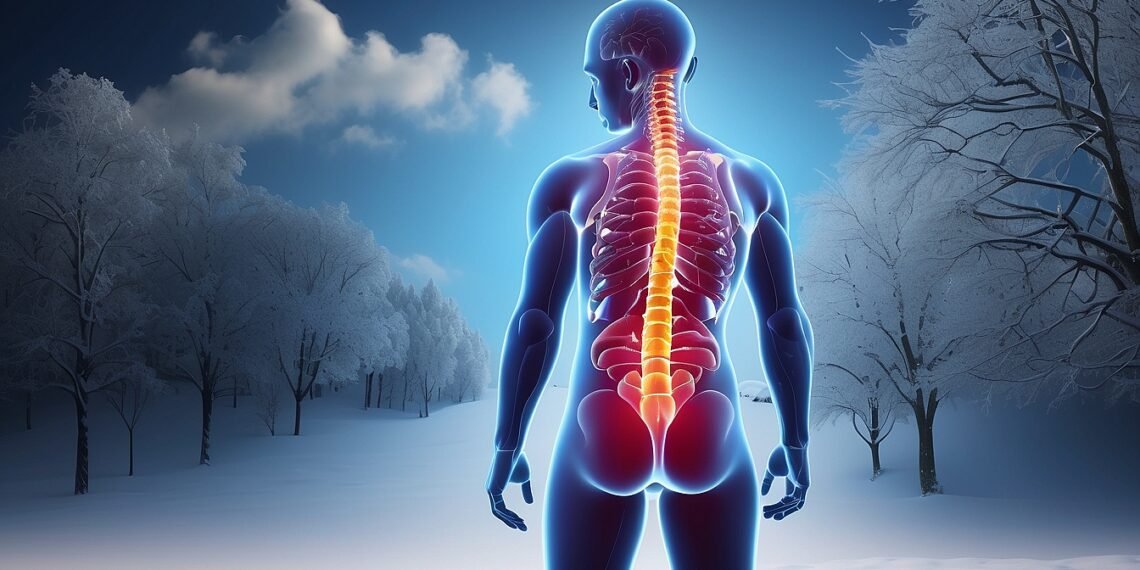Direct and indirect mechanisms: Cold weather can stiffen muscles and joints, leading to pain and decreased mobility. This can be exacerbated by existing back problems. Additionally, cold weather can trigger pain receptors and decrease blood flow to the area, further intensifying discomfort.
Treatment options:
- Heat therapy: Apply heat to the affected area using hot water bottles, heating pads, or warm compresses. This helps relax muscles and improve blood flow.
- Stretching and exercise: Gentle stretching and movement can help maintain flexibility and reduce pain. Consider low-impact activities like swimming or yoga.
- Over-the-counter pain relievers: Medications like ibuprofen or acetaminophen can provide temporary pain relief.
- Maintaining good posture: Avoid slouching and ensure proper spine alignment while sitting, standing, and walking.
- Staying warm: Dress in layers and wear gloves and a hat to prevent heat loss.
Definitions:
- Muscle stiffness: A decrease in the range of motion and flexibility of a muscle due to cold exposure.
- Blood flow: The movement of blood throughout the body, delivering oxygen and nutrients to tissues.
- Pain receptors: Sensory neurons that detect pain stimuli.
When to see a doctor:
- If back pain is severe, persistent, or worsens despite home remedies.
- If accompanied by numbness, tingling, weakness, or difficulty controlling bladder or bowel movements.
Additional resources:
- PDF: https://www.lancastergeneralhealth.org/services-and-treatments/neurosciences/programs-and-services/acute-low-back-pain
- YouTube video: https://m.youtube.com/watch?v=B6dc1J11Hio
Remember, consulting a healthcare professional is always recommended for personalized diagnosis and treatment plan.
Follow-up questions about back pain from cold weather:
Pain specifics:
- How would you describe the pain (sharp, dull, burning, aching)?
- Where is the pain located specifically? Does it radiate anywhere else?
- What is the intensity of the pain on a scale of 1-10?
- When did the pain start? Is it constant or intermittent?
- What makes the pain worse or better?
- Have you experienced any other symptoms besides pain, like numbness, tingling, or weakness?
Relationships:
- Does the pain affect your daily activities or relationships?
- How does the pain impact your work or hobbies?
- Are there any stressful events or changes in your life that might be contributing to the pain?
Treatment and management:
- What have you tried so far to relieve the pain?
- Have you taken any medications or used any treatments? If so, what were the results?
- Are you open to trying physical therapy or other alternative therapies?
- How comfortable are you taking over-the-counter pain medication?
Other potential causes:
- Have you been diagnosed with any underlying medical conditions like arthritis or spinal stenosis?
- Have you experienced any recent injuries to your back?
- Do you have any other risk factors for back pain, such as poor posture, smoking, or obesity?
Additional questions:
- Have you noticed any patterns in the occurrence of the pain?
- Are there any specific triggers that seem to bring on the pain?
- Do you have any concerns about the pain or your overall health?
It’s important to be as specific as possible when asking questions about back pain so that the healthcare professional can provide you with the most accurate diagnosis and treatment plan.

